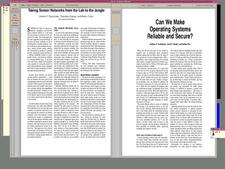FOSDEM 2010: Andrew Tanenbaum Sets Reliability Before Performance
Computer science veteran Andrew Tanenbaum presented the third version of his Minix operating system at the FOSDEM 2010 conference on February 6-7 in Brussels, Belgium.
The Minix 3 codebase first of all has much fewer bugs because of its size alone (3,000 lines compared to six million for Linux code), Tanenbaum said in his presentation. When questioned by Linux Magazine/Linux Pro Online about whether Minix's growing codebase may eventually end up with the same bug rate, Tanenbaum replied that it was more important to consider the type of bugs, which brought him back to his original argument against the Linux kernel. His view is that drivers and other services should not be poking around in the kernel and would thereby have less of a chance of endangering the system. Overall, he said, performance speed is less significant than reliability: "If someone had a choice between a two- and three-GigaHertz processor, they would take the slower one if it would run more stably over many years."
.
Tanenbaum's argument is practically the same as he's had for the past 20 years. His main track talk at FOSDEM (which one insider revealed to Linux Magazine/Linux Pro Online as having originally been handed in as a Lightning Talk) was therefore less of surprise. More interesting is that the computer science professor has recently found a community for his free BSD-licensed Minix 3 project. It was clear that he was having just as much fun as his audience at his talk, which was laced with humor and graphic elements and which was followed by a 20-minute question-and-answer and photo session.
Born in 1944 in New York, Tanenbaum currently teaches at the Free University of Amsterdam, where since 2008 his research has been under the aegis of a EU grant for design and implementation of particularly stable operating systems. Minix, which he started in the 1980s, is apparently the reference project. Since its third version, the microkernel operating system has been open source under a BSD license. Tanenbaum invites developers to visit the project page to encourage porting of programs and libraries. As immediate tasks he named live operating system updates without reboots and distributing Minix processes on many operating system kernels. The project icon is the raccoon ("At some point every project is an animal," says Tanenbaum), because it is small and clever and "because it eats bugs."
 With Minix, Tanenbaum is reseaching an operating system concept at the Vrije Universiteit in Amsterdam that is intended to be more reliable and secure than Windows and Linux. (Courtesy: Minix3.org.)
With Minix, Tanenbaum is reseaching an operating system concept at the Vrije Universiteit in Amsterdam that is intended to be more reliable and secure than Windows and Linux. (Courtesy: Minix3.org.)
Tanenbaum had written an earlier guest article on Minix for Linux Magazine Online. Whoever might be questioning the sense of a stable yet little distributed operating system that is currently serving primarily research might find some answers in a recent Slashdot discussion.
Comments
comments powered by DisqusSubscribe to our Linux Newsletters
Find Linux and Open Source Jobs
Subscribe to our ADMIN Newsletters
Support Our Work
Linux Magazine content is made possible with support from readers like you. Please consider contributing when you’ve found an article to be beneficial.

News
-
The Next Linux Kernel Turns 7.0
Linus Torvalds has announced that after Linux kernel 6.19, we'll finally reach the 7.0 iteration stage.
-
Linux From Scratch Drops SysVinit Support
LFS will no longer support SysVinit.
-
LibreOffice 26.2 Now Available
With new features, improvements, and bug fixes, LibreOffice 26.2 delivers a modern, polished office suite without compromise.
-
Linux Kernel Project Releases Project Continuity Document
What happens to Linux when there's no Linus? It's a question many of us have asked over the years, and it seems it's also on the minds of the Linux kernel project.
-
Mecha Systems Introduces Linux Handheld
Mecha Systems has revealed its Mecha Comet, a new handheld computer powered by – you guessed it – Linux.
-
MX Linux 25.1 Features Dual Init System ISO
The latest release of MX Linux caters to lovers of two different init systems and even offers instructions on how to transition.
-
Photoshop on Linux?
A developer has patched Wine so that it'll run specific versions of Photoshop that depend on Adobe Creative Cloud.
-
Linux Mint 22.3 Now Available with New Tools
Linux Mint 22.3 has been released with a pair of new tools for system admins and some pretty cool new features.
-
New Linux Malware Targets Cloud-Based Linux Installations
VoidLink, a new Linux malware, should be of real concern because of its stealth and customization.
-
Say Goodbye to Middle-Mouse Paste
Both Gnome and Firefox have proposed getting rid of a long-time favorite Linux feature.


One of the
http://www.shredmonkey.net/